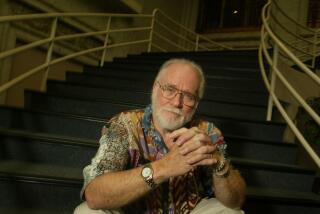PASSINGS: Ben Pleasants, Kenneth Appel
Ben Pleasants
L.A. poet and playwright
Ben Pleasants, 72, a Los Angeles poet and playwright who also championed the work of Charles Bukowski and John Fante in literary critiques, died of a heart attack April 18 in Crescent City, his wife, Paula, said.
Born Aug. 6, 1940, in Weehawken, N.J., Pleasants graduated from Hofstra University on New York’s Long Island in 1962 and within a few years enrolled in graduate English courses at UCLA.
Beginning in the mid-1960s he wrote for the Los Angeles Free Press and regularly contributed book and theater reviews to The Times from the late 1960s until the mid-1980s. He reviewed Bukowski’s poetry in The Times at a time when few mainstream publications cast their eye on the gritty work, and in 2004 published “Visceral Bukowski: Inside the Sniper Landscape of L.A. Writers,” a memoir that had originally been intended as a biography. The book became controversial for Pleasants’ assertions that Bukowski harbored Nazi sympathies.
Decades after Fante wrote “Ask the Dust” in the 1930s, Pleasants helped revive interest in the obscure Depression-era novel set in Los Angeles by urging its reissue by Black Sparrow Press in 1979 and paving the way for its eventual cult status.
Pleasants also became a playwright, penning “The Hemingway/Dos Passos Wars” and “Contentious Minds: The Mary McCarthy/Lillian Hellman Affair,” among other plays.
Besides writing, Pleasants worked as a teacher in the Los Angeles Unified School District for 30 years, retiring in 1998.
One of his last pieces was “Support Your Local Bookstore,” an essay published in March at Counterpunch and elsewhere online.
Kenneth Appel
Proved a major math theorem
Kenneth Appel, 80, a mathematician who paired with another scientist to become the first to use a computer to prove a major mathematical theorem, died April 19 in Dover, N.H., according to the Tasker Funeral Home. He had esophageal cancer.
Appel was a longtime educator who chaired the University of New Hampshire mathematics department, retiring in 2003. Before that, he was a faculty member at the University of Illinois at Urbana. In 1976, he and Wolfgang Haken used 1,200 hours of calculations from an IBM computer to prove that a flat map can be colored with only four colors, so that contiguous countries have different colors.
Proving the 100-year-old “Four-Color Conjecture” was considered a major achievement at the time, though highly unpopular with some mathematicians who did not trust the performance of computers, and voiced their concerns for years afterward.
As a 1982 Times story put it, “In the absence of checkability, is the proof valid? How can we be sure the computer did what we thought it did? How can we be sure that it didn’t make a mistake? What does it mean to have proofs that people cannot examine?”
Appel and Haken received the American Mathematical Society and the Mathematical Programming Society’s Delbert Ray Fulkerson prize in 1979.
Since retirement, Appel counseled students at Dover High School, helping to set up an Internet-based homework system, and served on the Dover Board of Education.
Born Oct. 8, 1932, in Brooklyn, N.Y., Appel grew up in Queens and graduated from Queens College in 1953 with a bachelor’s degree in mathematics. He worked as an actuary before serving two years in the Army. After his discharge he earned a doctorate in mathematics from the University of Michigan, then did research in cryptography at the Institute for Defense Analyses before moving on to the University of Illinois.
Los Angeles Times staff and wire reports
More to Read
Start your day right
Sign up for Essential California for the L.A. Times biggest news, features and recommendations in your inbox six days a week.
You may occasionally receive promotional content from the Los Angeles Times.






